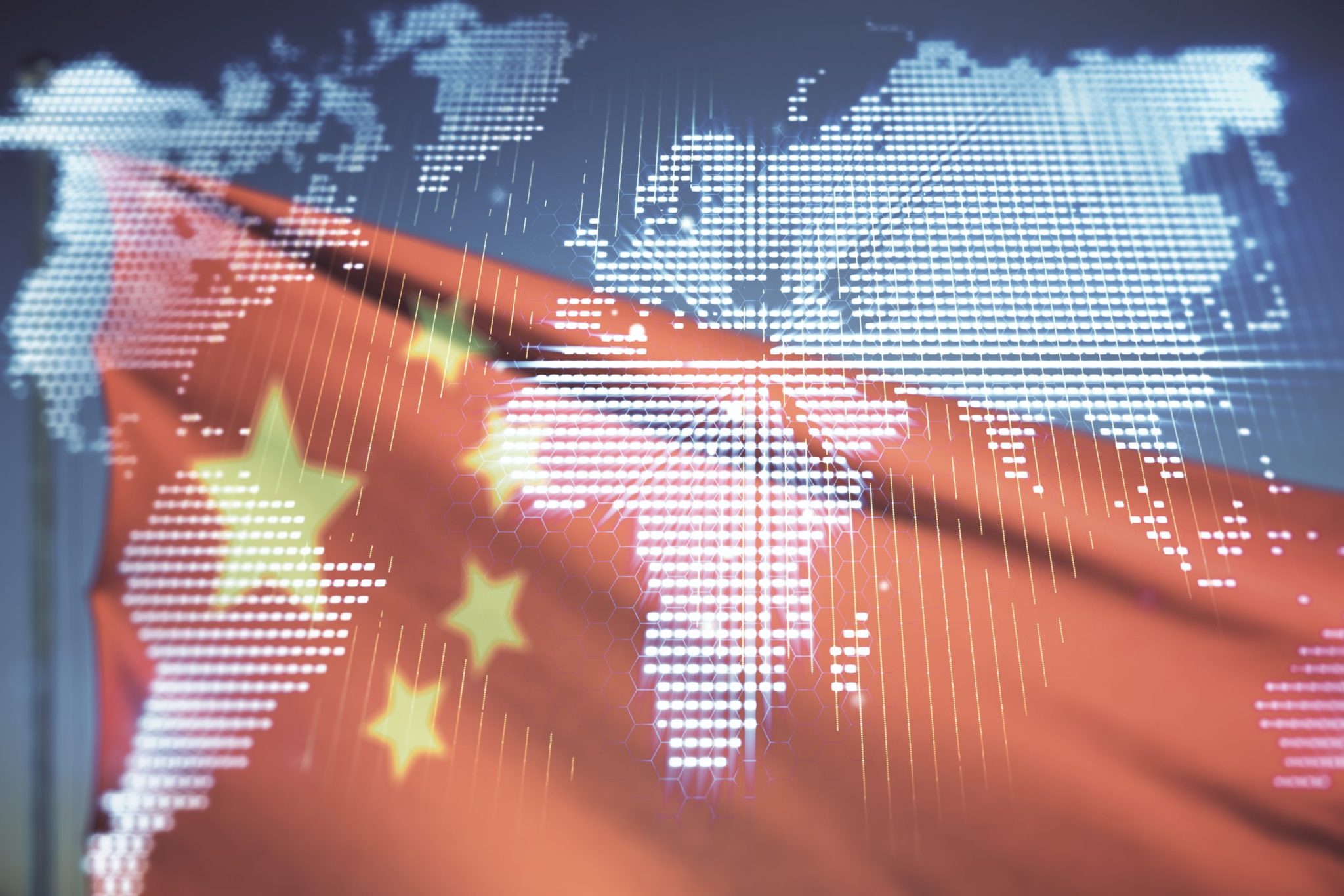Introduction
In January 2012, the government of the People’s Republic of China (PRC)’s state-owned broadcaster CCTV opened an African branch headquartered in Nairobi, Kenya. Shortly thereafter, CCTV Africa—later rebranded as CGTN Africa—began publishing videos on a dedicated YouTube channel. The outlet has now published over 54,000 videos and gathered more than 830,000 subscribers on YouTube, making it the most subscribed to CGTN-affiliated channel on YouTube after CGTN English.
Though the PRC’s effort to shape public opinion in Africa is not limited to international broadcasting, the content produced by CGTN Africa provides a valuable window into the messages Beijing seeks to prioritize with African audiences. In an effort to better understand those priorities, this piece analyzes all videos that were published on CGTN Africa’s YouTube channel between August and October 2023. What emerges from this analysis is that PRC messaging in Africa promotes the broad idea that Western democracies and existing multilateral institutions are at best ineffective and at worst active hindrances to the continent’s development. By contrast, CGTN Africa presents PRC projects and initiatives as not only viable alternatives, but also as the best way to ensure Africans’ prosperity and, ironically, freedom from rapacious foreign powers.
I. Methodology
This paper aims to provide additional insight for researchers and policymakers trying to understand PRC messaging in Africa. Within the relatively narrow confines of one PRC state media outlet’s YouTube channel, the analysis looks to identify some of the main characteristics and patterns in that messaging.
To achieve that objective, data was retrieved using the Alliance for Securing Democracy’s Hamilton 2.0 dashboard, which continuously collects data on hundreds of social media accounts belonging to individuals or entities connected to Russian, PRC, or Iranian government entities or state-funded media outlets. The dashboard retrieved 851 videos published by CGTN Africa between August 1 and October 31, 2023, all of which were either in English or had English subtitles. It detected which countries were mentioned in those videos using Microsoft’s cognitive services.
An analyst then reviewed the written summary of each video and coded the primary themes of each segment based on more than 20 topical categories such as culture, economy/trade, and sports. (See the Appendix for an exhaustive list of topical categories). The analyst then associated each video with as many themes as necessary to accurately portray its content. Videos that were unlikely to be editorialized—for example, those covering natural disasters or sports—were removed; all other videos were viewed in full or in part. The analyst then noted, where applicable, countries that were not detected by the automated system. Particular attention was paid to the most viewed and liked videos in our dataset.
II. Top Topics
Reflecting the broader priorities in PRC-Africa relations, economy/trade was the most covered topic in CGTN Africa content posted to YouTube during the studied period. Many of those stories covered trade ties between the PRC and various parts of the continent. However, while PRC investments and infrastructure projects in Africa were frequently highlighted by CGTN Africa, several of the outlet’s other videos focusing on economy/trade covered purely African economic developments. This is illustrative of CGTN Africa’s attempts to produce content that appeals to local African audiences in addition to its more boilerplate propaganda segments, like short videos in Mandarin that advertise “benefiting the people” as “the root” of the “philosophy behind China’s governance”.
Figure 1: Top 20 topics in CGTN Africa YouTube videos between 8/1/2023 and 10/31/2023
Multilateralism was another recurring focus over the studied period. Part of that focus can be explained by the high degree of involvement of various UN agencies and multilateral lenders in Africa, as well as the prominence of the African Union and other regional organizations in governance on the continent. However, many of the videos covering multilateralism were centered on PRC-led formats, most notably BRICS, the intergovernmental organization originally comprising Brazil, Russia, India, the PRC, and South Africa.
Although coverage of events outside of Africa was limited—we coded fewer than 25 videos that did not focus on Africa, the PRC, or the conflict in the Middle East (the Israel-Hamas war was coded separately due to its prominence during the studied period)—those videos offered a telling look at PRC efforts to influence African perceptions of global events. A prime example was a detailed, half-hour segment about Japan’s release of treated radioactive water in the Pacific Ocean, which the PRC outlet warned might “still be contaminated and therefore unsafe”. As of January 1, 2024, however, that video had only been viewed 425 times. Though videos focusing on non-African global events were relatively rare and received few views, the outlet’s decision to focus on certain topics of no real relevance to African audiences serve to highlight CGTN Africa’s propagandistic objectives.
III. Most Viewed Videos
Videos posted to CGTN Africa’s YouTube channel between August and October 2023 received slightly more than 770,900 views and 16,000 likes, an average of less than a thousand views and 20 likes per video. Those relatively pedestrian numbers were also significantly inflated by a few viral videos; in particular, a long-form segment about French colonialism in Africa, which was the most viewed video and accounted for close to a third of all views and a quarter of all likes during the studied period.
|
Video Title |
Date |
Description |
Views |
Likes |
Comments |
|
8/13/2023 |
Hostility against France in their former West African colonies has hit an all-time high. In Mali, Burkina Faso, and Niger the pushback has been angry, messy and noisy. This week Talk Africa explores the genesis of anti-French sentiment in Francophone West Africa, how it’s playing out, its geopolitical… |
245,427 |
3,900 |
1,443 |
|
|
8/20/2023 |
The world’s attention is on South Africa as it gears up to host the 15th BRICS summit—a pivotal gathering of five influential nations that could reshape the global order. Under the theme “BRICS and Africa: Partnership for Mutually Accelerated Growth, Sustainable Development, and Inclusive Multilateralism… |
78,705 |
1,300 |
282 |
|
|
Hawaii wildfires aftermath: Maui”s chief of emergency management resigns |
8/20/2023 |
Maui County Emergency Management chief Herman Andaya resigned on Friday following criticism on how the Hawaiian island responded to the deadly fires. The death toll continues to rise, and hundreds are still missing. #mauifires #hawaiifires |
44,619 |
641 |
355 |
|
G20 approves African Union as permanent member at New Delhi summit |
9/9/2023 |
Dr. Sizo Nkala, of the Centre for Africa China Studies at the University of Johannesburg, says the inclusion of the AU recognizes the importance of Africa in shaping the global issues, like climate change and migration. Nkala added that the inclusion of the AU boosts the G20’s legitimacy as a global format. |
40,186 |
936 |
108 |
|
8/4/2023 |
Niger’s military leaders revoked a set of military cooperation agreements with France. The decision, which affects five military deals dating between 1977 and 2020, could have far-reaching impacts on the fight against an extremist insurgency in the region. |
29,156 |
437 |
299 |
|
|
8/30/2023 |
Political Scientist, Frederick Golooba-Mutebi, shares his insights on the immediate political and business implications for Gabon and the wider Central African subregion if the apparent military takeover succeeds. |
22,789 |
250 |
102 |
|
|
President Xi meets leaders of Iran, DR Congo, Malawi, Tanzania and Namibia |
8/26/2023 |
PRC President Xi Jinping met with his counterparts from Iran, the Democratic Republic of #Congo, #Malawi, #Tanzania, and #Namibia on the sidelines of the #BRICS Summit. |
20,691 |
446 |
76 |
|
10/8/2023 |
Fighting continues between Israeli and Palestinian forces from Gaza. Israeli Prime Minister Benjamin Netanyahu has declared war on Hamas, following Saturday’s surprise attack. Over five hundred people have been killed in the conflict and thousands more wounded. |
20,593 |
110 |
10 |
|
|
Hawaii residents return to charred remains after deadly wildfires |
8/16/2023 |
A deadly wildfire that swept through part of the Hawaiian island of Maui left behind a trail of death and destruction. Residents who are now returning say they are stunned by the devastation but are optimistic that they can rebuild. |
19,554 |
208 |
71 |
|
8/5/2023 |
Worshippers held prayers for peace in Niger’s capital Niamey after the regional bloc ECOWAS devised a possible plan to reinstate ousted President Mohamed Bazoum by force. |
15,917 |
163 |
100 |
Figure 2: Top performing CGTN Africa videos posted between 8/1/2023 and 10/31/2023 (numbers accurate as of 11/19/2023)
Notwithstanding the fact that CGTN Africa is only part of the PRC’s extensive media presence on the continent, the channel’s low YouTube viewership supports other researchers’ warnings not to overstate PRC media influence on the continent. Still, the channel’s ten most viewed videos provide a good illustration of some of the main narrative trends that were observable throughout the entire corpus of content posted by CGTN Africa’s YouTube channel over the studied period, thus providing a window into both the PRC’s efforts to win hearts and minds on the continent and where those efforts seemingly found an audience.
IV. Narrative analysis
Besides segments that covered major breaking news stories, many of the videos reviewed for this report broadly fell into two categories: those that denigrated Western democracies and the existing international governance system and those that lionized the PRC, its initiatives, and the countries that subscribe to them.
- The decline of the Western-led international order
France was a regular target in CGTN Africa’s coverage—it was the third most mentioned non-African country (after the PRC and the United States) and the ninth most mentioned country overall during the studied period. The most viewed video, for example, was a long-form segment devoted to French colonialism in Africa that opened with a voiceover proclaiming that “to some critics…the French never really left Africa, for others, they are just meddlesome”. The use of loaded statements was a recuring theme in CGTN Africa videos that often stressed that they would be presenting “mixed” views before then proceeding to only show shades of a single position.
CGTN Africa’s coverage of the coups that occurred in Niger in July 2023 and in Gabon a month later also had a distinct anti-French and a corresponding pro-junta orientation. The outlet ran several segments featuring local populations participating in “anti-French protests” or calling for the ”sweeping [of] French troops out of the country”. These segments consistently featured Russian flags held up by some of the protesters, with one guest commentator telling CGTN that “the [geopolitical space] is shifting, we have the likes of China, we have the likes of Russia [now]”.
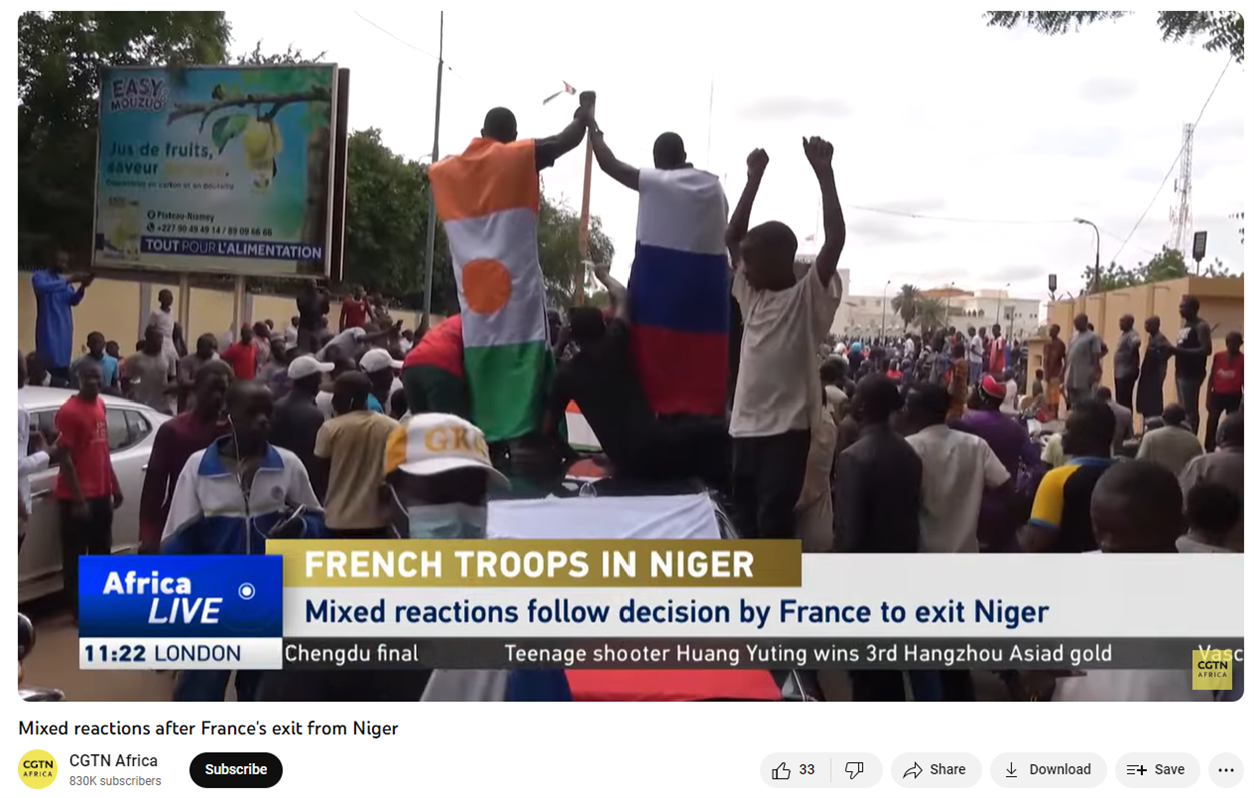
France was not the only target of this anti-colonial strand in CGTN Africa’s reporting. When King Charles III landed in Kenya at the end of October, the handful of segments devoted to the visit zeroed in on the harms of British colonization. Repeating a vox populi format used to attack France in Niger, CGTN Africa travelled around Kenya to present the “mixed reactions among Kenyans about [the] British royal visit”. That video opened with a shepherd who lost both arms to an old British landmine before reporting that British forces training in the country “have been accused of rape and murder”.
More generally, CGTN Africa consistently portrayed Western democracies in a negative manner. For instance, the August wildfire in Hawaii, one of the rare stories covered by CGTN Africa with no relation to Africa, was at the center of two videos, both of which focused, to varying degrees, on the supposed incompetence of the local authorities. CGTN also criticized the dominance of the US dollar, more or less explicitly ascribing African countries’ economic woes to dependence on the US currency. Even seemingly more neutral videos—like a segment ostensibly about the rise of Ethiopia-US trade in 2022—were spun to blame US regulation and bad economic conditions for lower figures in 2023.
The European Union was often shown in a similarly unfavorable light. For instance, over the studied period, CGTN Africa devoted three different segments to how new EU rules were threatening the livelihoods of citrus farmers in South Africa.
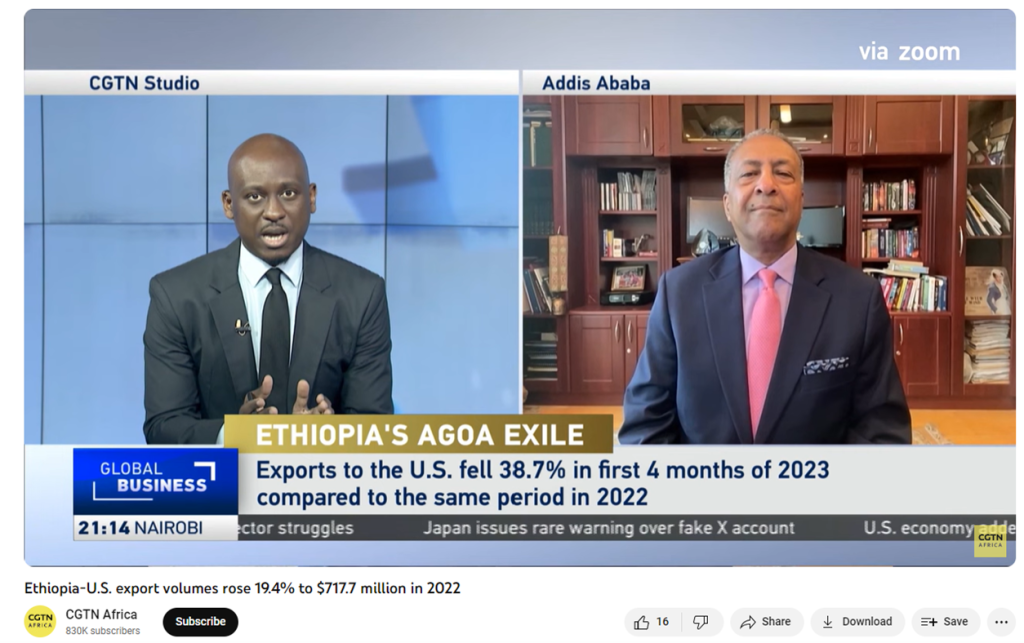
CGTN Africa did not limit its negative portrayal of Western global governance to the economic sphere. A video about Tunisia’s rejection of EU funding to curb immigration portrayed Brussels as a vehicle for French neo-colonialism. CGTN also lambasted the United States over its sanctions of a paramilitary group in Sudan, as well as its support for Israel despite opposition from most Arab and African nations.
Lastly, criticism of Western democracies occasionally morphed into a broader rejection of the existing rules-based order and the institutions underpinning it. For instance, two videos about the World Bank’s withdrawal of funding to Uganda over its anti-homosexuality laws focused on the negative impact of the withdrawal without exploring the problematic discrimination that led to the international lender’s decision. One segment that highlighted Uganda’s “new options” following the World Bank’s withdrawal concluded with images of a PRC factory there.
Even African institutions occasionally found themselves in the state media outlet’s crosshairs. The most telling example was the sustained criticism of ECOWAS—a political and economic union made up of 15 West African countries—in the aftermath of the coup in Niger. Between August and October 2023, CGTN Africa ran at least four video segments highlighting the negative impact of the organization’s sanctions on Niger, as well as on neighboring Benin and Nigeria’s “trucking business”. Though the PRC outlet refrained from explicitly questioning ECOWAS’ raison d’être, it often implied that Western interference was afoot. For instance, CGTN Africa titled one of its videos “ECOWAS pressured to take hard stance against military takeovers”. Although the video did not elaborate on who was allegedly applying “pressure”, five of the segment’s 11 YouTube comments connected the dots and accused the West of meddling.
2. The Rise of the PRC-led international order
In parallel to its effort to undermine Western democracies and international institutions, CGTN Africa openly promoted PRC-led initiatives and alternatives. The Belt and Road Initiative (BRI), Beijing’s flagship global infrastructure program, was the topic of at least 20 videos—not including some culture-related segments that had #BRI in their descriptions despite having only a tangential connection to the initiative. Besides PRC-funded infrastructure projects, CGTN Africa also promoted Sino-African efforts in agriculture, broadcasting, health, science, education, and space.
The clearest example of CGTN Africa’s promotion of PRC-led initiatives was the extensive coverage it devoted to the BRICS summit held in South Africa in August 2023. South Africa was the most mentioned country in CGTN Africa videos between August and October, besting the PRC and nearly doubling the mentions of Kenya, the third most mentioned country. The BRICS grouping was also the topic of 60 videos, including two long formats, between August and October. By way of comparison, CGTN Africa only dedicated seven segments to the G20, even though the G20 also had a summit during the studied period.
CGTN Africa’s BRICS coverage was exclusively upbeat and optimistic, sometimes verging on pollyannish. In a year that saw the accession of six new countries into the bloc, CGTN Africa trumpeted the expansion as a “historic event” that would “raise the voice of the Global South”. Several videos also explained how the format would benefit developing countries, with a few specifically devoted to how Africa stood to gain from it.
While much of the coverage around the BRICS summit presented general rather than specific benefits BRICS provides for developing nations, one point that was repeatedly emphasized was the de-dollarization of the global economy. Several videos called for the development of a new trading currency, possibly “backed by gold”, with another touting the advent of a “new global trading architecture”.
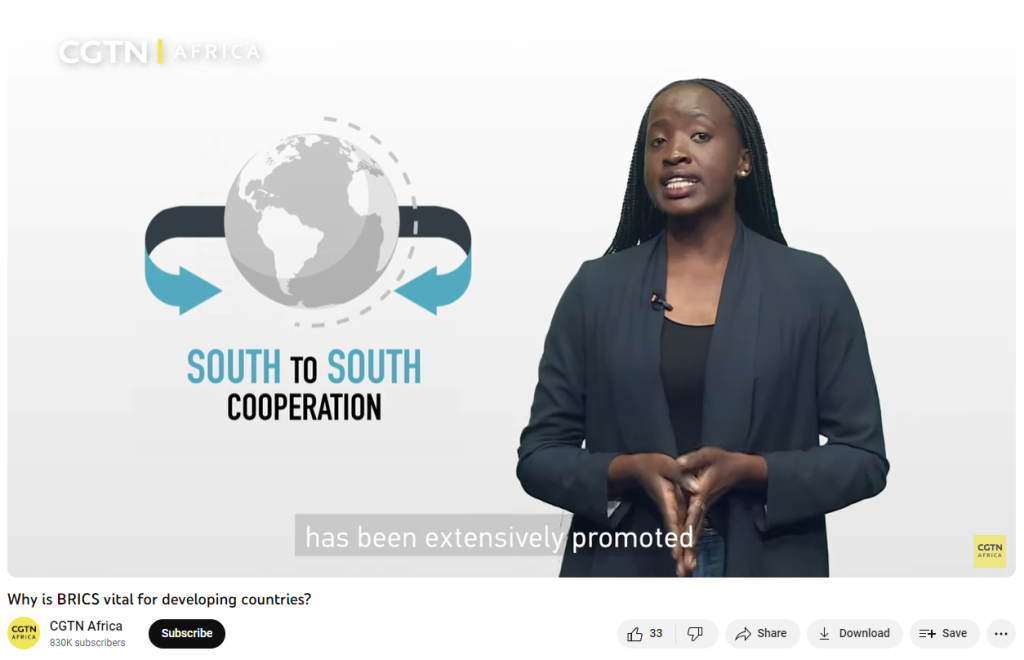
In a few videos, the PRC-led BRICS grouping was portrayed as a successor to the non-aligned movement and as an alternative to the G7, which CGTN alleged is a club of hegemonic powers that only preach to one another. Another segment predicted that BRICS would “dialogue” with the G7, implicitly making it out as a natural counterweight. This competition with the G7 was also observable, albeit in a less pronounced manner, in CGTN Africa’s coverage of the G20, a group that includes the PRC (and all original BRICS countries) among its ranks. Not only did the state media outlet devote almost ten times more coverage to the BRICS gathering, but it also covered the G20’s New Delhi summit in a decidedly more ambivalent tone.
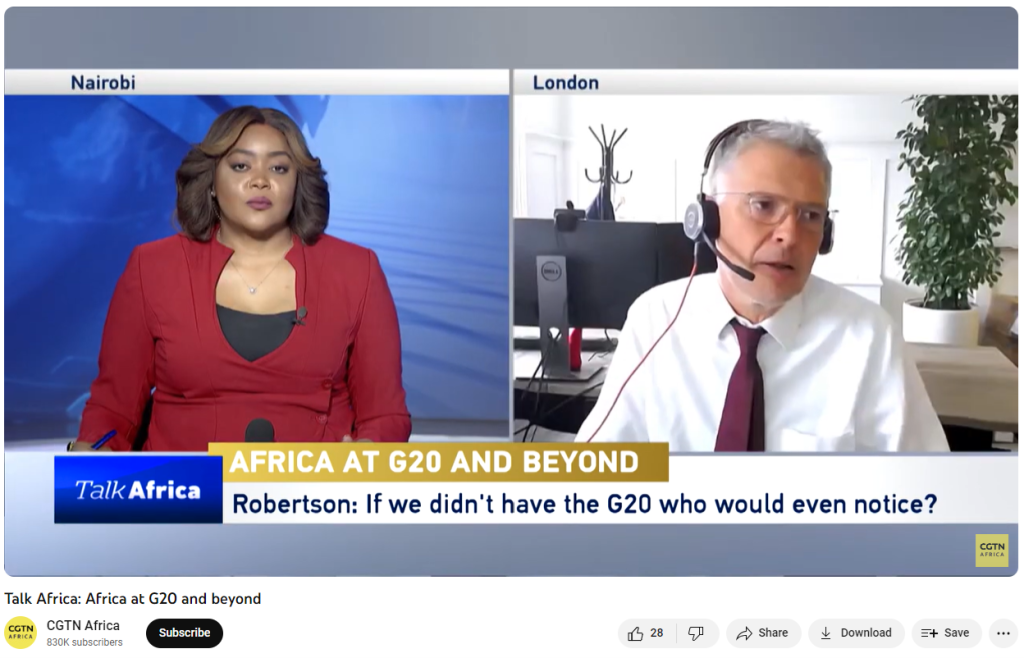
This was especially apparent when comparing the only long-form segment CGTN Africa ran about the G20’s summit and expansion to include the African Union with the two long videos it published about the BRICS summit and its ramifications for the continent. While the latter coverage was exclusively positive, the former opened by asking whether the African Union’s inclusion was motivated by a desire to undermine BRICS. It then questioned the effectiveness of the G20 with chyrons lamenting “conversation but not progress” and asking whether anyone “would even notice” should the grouping disappear. Guests in another short segment on the G20’s New Delhi summit similarly justified Xi and Russian President Vladimir Putin’s absence from the event by pointing out the lack of real results produced at international gatherings.
CGTN Africa also had far more praise for South Africa’s hosting of the BRICS summit than for fellow BRICS member India’s hosting of the G20 gathering. South Africa was lauded as an “effective chair” and “applauded” for being a key force behind BRICS’s expansion. By contrast, videos about the G20 did not expand on India’s role in pushing for more African representation, preferring instead to point out the PRC’s constructive participation in the proceedings.
CGTN Africa’s dismissal of the expansion of the G20—of which the PRC is a member—on the African continent suggests that the PRC’s championing of BRICS expansion in Africa is motivated less by a true desire for African representation in multilateral settings and more by its ability to dictate the terms of expansion and to secure keynote addresses for its leadership. After all, the G20 put Africa in the spotlight at this year’s summit and was hosted by India, itself a developing nation as well as a founding member of the BRICS. However, the BRICS summit provided the better opportunity for the PRC to advertise itself and its leadership. CGTN Africa ran a couple of videos covering Xi’saddress to the rest of the gathering as well as a segment ostensibly talking about “how the African press is covering the BRICS summit” that in fact revolved around an article penned by the PRC leader.
Conclusion
A thorough review of the content posted on CGTN Africa’s YouTube channel between August and October 2023 provides insight into the worldview that the PRC is promoting in Africa. According to CGTN Africa, Western democracies and existing international or even regional institutions are unhelpful in addressing the continent’s challenges. The state media outlet highlighted the alleged ongoing meddling of former colonial powers as well as the supposed destabilizing influence of developed economies on the continent. By contrast, CGTN Africa presented PRC-led investments, collaborations, and multilateral forums as mutually beneficial opportunities that can help African countries secure their citizens’ prosperity.
Uncertainties remain around the impact and reception of this messaging with Africans. In particular, the low views on most of the reviewed content suggest that, at least on YouTube, CGTN Africa is failing to reach a broad audience. However, the relative success of videos on France’s presence on the continent suggests that PRC messaging occasionally resonates with online audiences. CGTN Africa’s YouTube channel also only represents a small fraction of a PRC influence effort that extends across other online channels, television, radio, newspapers, and more. Democratic governments across the transatlantic space should devote more attention and resources to understanding and stemming the constant flow of negative coverage they are receiving from the world’s second largest economy on the continent with the world’s fastest growing population.
Appendix
Below is the full list of categories used to code videos along with a few examples of the content associated with each category. Each video could be associated with more than one category.
- Bilateral: video covering relations between two states.
- Example: Tanzania-China trade volumes to surpass $8.31 billion (bilateral, PRC, economy)
- BRI: video covering the Belt and Road Initiative, the PRC’s global infrastructure project.
- Example: Experts share views on railway projects in Nigeria under BRI cooperation (bilateral, BRI, infrastructure)
- BRICS: video covering the BRICS grouping and activities related to it.
- Example: BRICS nations tech gurus meet to find solutions to world’s challenges (BRICS, digital)
- Climate change: video covering the impact and/or responses to climate change.
- Example: World Bank to fund green hydrogen export initiative (multilateral, climate change, digital)
- Colonialism: video explicitly referring to Europe’s colonial history in Africa.
- Example: Kenya welcomes Britain’s King Charles III (colonialism, bilateral)
- Coups: video covering military coups and/or their consequences.
- Example: Burkina Faso thwarts coup attempt (coups)
- Culture: video covering a cultural development on the continent.
- Digital: video covering the digital sector. Decision was taken to highlight this sector in particular given its centrality in the PRC’s global geoeconomic strategy.
- Example: TikTok helping youth overcome unemployment crisis in South Africa (PRC, economy, digital)
- Economy/trade: video pertaining to an economic and/or financial development.
- Example: Germany looking to buy natural gas from Nigeria (bilateral, economy)
- Elections: video covering elections and/or their direct consequences.
- Example: Deal between rival Libya representatives paves way for election (election)
- Food security: video pertaining to access to food.
- Example: Chinese native crop gaining popularity in Rwanda (PRC, food security)
- France: video covering France and/or French activities in Africa.
- Example: French troops withdrawal from Niger nearly half-complete (France, security)
- G20: video covering the G20 grouping and activities related to it.
- Example: Expert discusses implications of Africa’s inclusion in the G20 (G20, multilateral)
- Health: video pertaining to public health.
- Example: New preventive HIV injectable drug set to enter Ugandan market (health)
- Humanitarian: video covering large-scale human-interest stories.
- Example: 17 bodies recovered after boat capsizes in eastern Nigeria (humanitarian)
- Infrastructure: video covering an infrastructure-related development
- Example: South Africa, China pen joint MOU on energy cooperation (bilateral, PRC, economy, infrastructure)
- Israel-Palestine: video covering developments tied to the military campaign initiated by Israel in response to Hamas’ October 7 attacks. Given the importance of this conflict starting in October, the decision was taken to separate this category from the “not Africa” category in order not to overemphasize CGTN Africa’s coverage of other parts of the world.
- Example: Talk Africa: Israeli-Palestinian conflict polarizes Africa (Israel-Palestine)
- Multilateral: video covering multilateral formats, groupings, and organizations.
- Example: World Bank chief begins two-nation visit to Africa (economy, multilateral)
- Natural disaster: video covering natural disasters and their consequences.
- Example: Tanzanian gov’t warns citizens to take precautions as El-Nino begins (natural disaster)
- Not Africa: video exclusively covering countries not on the African continent.
- Example: Nearly 100 killed in blaze at wedding party in Iraq (humanitarian, not Africa)
- PRC: video covering the PRC and/or PRC activities in Africa.
- Example: China Development Bank, Exim Bank of China to set up $48.8 billion financing windows (PRC, economy)
- Protest: video covering civil unrest.
- Example: Protests in Senegal after opposition leader Sonko was detained (protest)
- Russia: video covering Russia and/or Russian activities in Africa.
- Example: Putin extends condolences to families of people killed in plane crash (humanitarian, not Africa, Russia)
- Security: video covering military and law enforcement activities in Africa.
- Example: Sudanese army, paramilitary RSF resume dialogue in Saudi Arabia (security)
- Self-reliance: video highlighting/promoting the development of indigenous technologies and/or means of production in Africa.
- Example: Experts call for increase in local production, incentives to boost fish farming in Nigeria (food security, self-reliance)
- Science: video highlighting scientific developments or initiatives.
- Example: Kenyan-China backed lab develops new high yielding plant variety resistant to pests (PRC, science)
- Soft power: video highlighting the PRC’s normative influence in Africa.
- Example: Kenyan, Chinese publishers sign memorandum for publishing Chinese textbooks (PRC, soft power)
- Space: video covering spatial exploration and research developments.
- Example: South Sudanese students benefit from remote learning program with taikonauts (PRC, science, space)
- Sport: video covering athletes and/or athletic events and results.
- Example: Springbok players reflect on tough tie against England (sport)
- Terrorism: video covering terrorist attacks and their consequences.
- Example: Somalia’s military and allied fighters capture Al-Shabaab militants’ main stronghold (security, terrorism)
- US: video covering the United States and/or its activities in Africa.
- Example: U.S. Senate rejects legislation to withdraw troops from Niger (US, security)
The views expressed in GMF publications and commentary are the views of the author alone.

